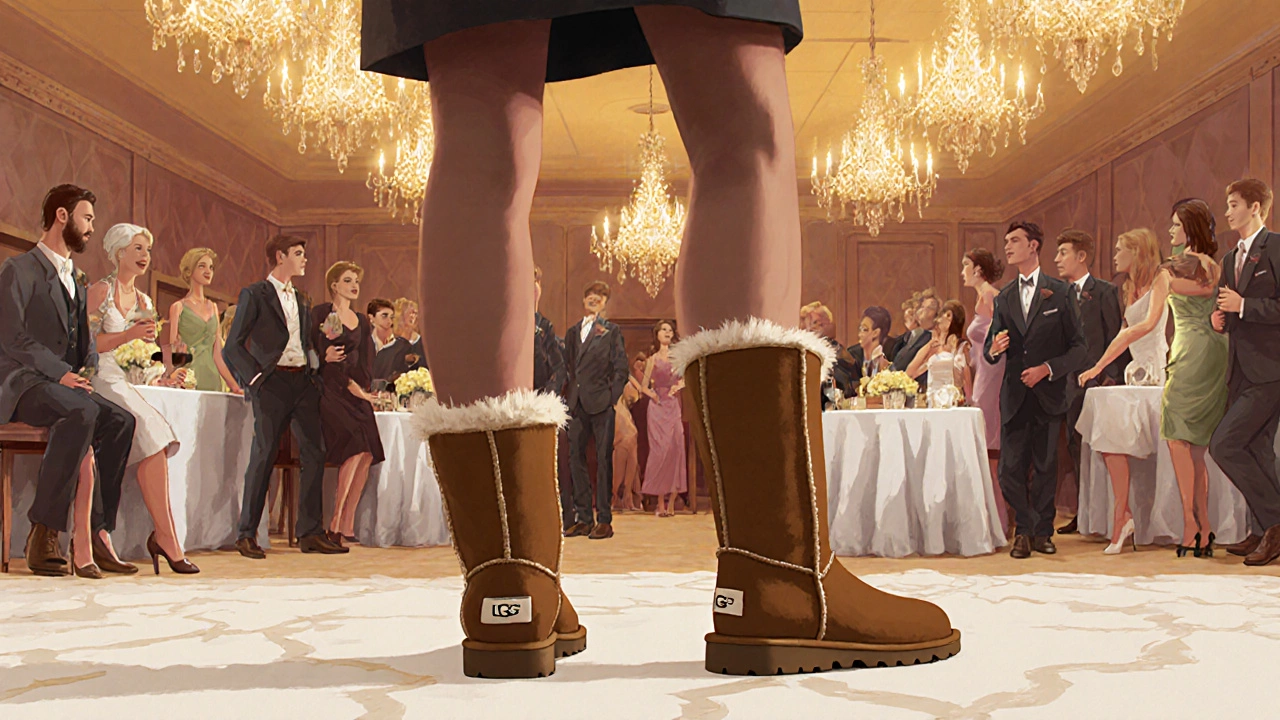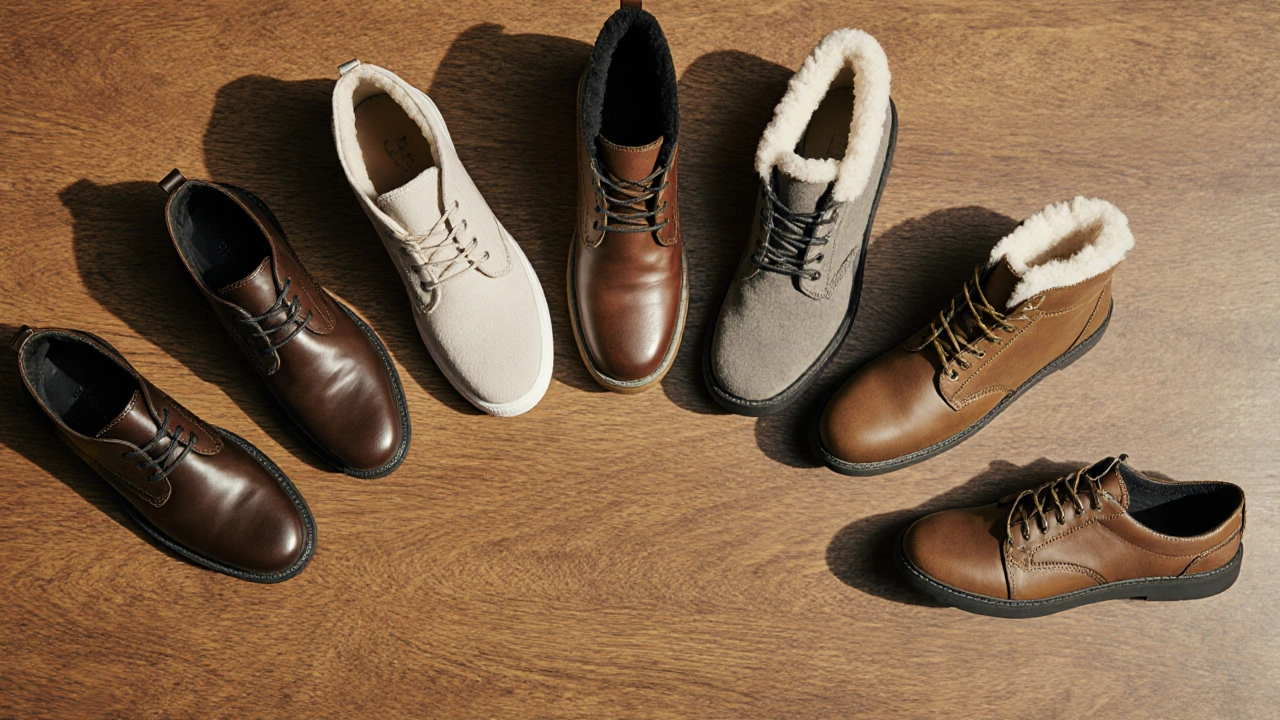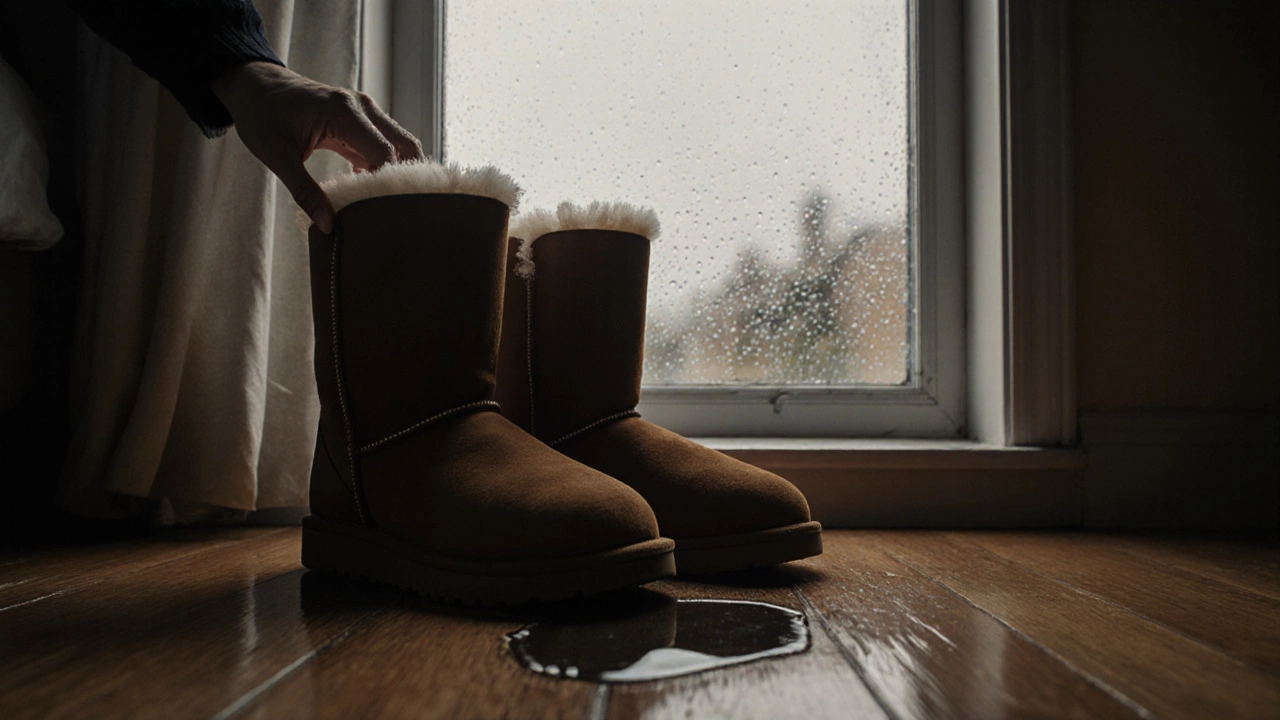Should You Wear Uggs Today?
Enter your conditions and click "Check If Uggs Are Appropriate" to get recommendations.
Ever grabbed your favorite pair of Uggs on a rainy morning and wondered if that was a good idea? You’re not alone. These cozy sheepskin liners are great for staying warm, but they don’t fit every scene. This guide walks you through the moments you should leave them at home, why it matters, and what to wear instead.
Key Takeaways
- Ugg boots shine in cold, dry settings but should be avoided in formal, wet, or hot environments.
- Watch out for places with strict dress codes, such as offices, weddings, or upscale restaurants.
- Consider the material - sheepskin can slip on smooth floors and isn’t waterproof.
- If you have a wool allergy, Uggs may cause skin irritation.
- Swap to alternative shoes when you need durability, breathability, or a polished look.
What Exactly Are Ugg boots?
Ugg boots are a type of casual footwear that feature a soft sheepskin lining and a suede or leather exterior. They were originally designed in Australia for surfers to keep their feet warm after a cold surf session, and they gained global popularity in the early 2000s. The key benefits are:
- Excellent insulation - the natural fibers trap air and retain heat.
- Lightweight and flexible, making them easy to slip on and off.
- Comfortable enough for all‑day wear indoors.

Top Situations to Skip the Uggs
Below are the most common scenarios where Uggs can backfire.
1. Formal Events
Weddings, galas, or black‑tie dinners usually call for polished shoes. Uggs, being casual, can clash with the formal events dress code, making you look under‑dressed.
2. Business Settings
Most corporate offices expect business attire that’s neat and professional. Uggs can appear too relaxed for meetings or client presentations.
3. Hot Weather
When temperatures rise above 20°C (68°F), the sheepskin lining can cause sweaty, uncomfortable feet. The breathable factor drops dramatically, leading to odor and blisters.
4. Wet Conditions
Uggs are not designed to be waterproof. In rain, snow, or puddles, the suede exterior soaks up water, and the interior loses its insulating properties. A pair of waterproof shoes or rubber boots are far better.
5. Slippery Surfaces
Polished floors, tiles, or office carpet can become slick under the soft sole, increasing the risk of slips.
6. Indoor Carpet or Plush Rugs
The sheepskin can leave lint or small fibers on delicate indoor carpet, especially in high‑traffic areas.
7. School Uniform Policies
Many schools have strict uniform guidelines that prohibit casual footwear like Uggs. Check the dress code before sending your child to class.
8. Health Concerns
If you suffer from a wool allergy, the sheepskin can trigger itching, redness, or a rash.
Quick Reference Table
| Situation | Recommended? |
|---|---|
| Cold, dry outdoor walks | Yes - ideal |
| Office or business meeting | No - choose leather loafers or low‑cut boots |
| Rain or snow | No - opt for waterproof shoes |
| Formal dinner or wedding | No - go for dress shoes |
| Indoor carpeted area | Limit - could leave lint |
| Hot summer day | No - pick breathable sneakers |
| School uniform day | No - follow policy |
| Wool allergy | No - avoid sheepskin |
Styling Alternatives for the ‘No‑Ugg’ Moments
Knowing what to wear instead helps you stay comfortable and look appropriate.
- Waterproof boots - leather or rubber styles keep feet dry and still look rugged.
- Minimalist sneakers - canvas or knit options breathe well for warm days.
- Dress shoes - oxfords or brogues pair nicely with suits and formal dresses.
- Loafers - slip‑on leather loafers strike a balance between casual and polished.
- Insulated ankle boots - for very cold but wet conditions, a snug insulated boot outperforms a Ugg.
When you do need the cozy vibe indoors, consider a pair of sheepskin slippers that stay on a single floor surface and won’t shed lint.

Common Myths About Uggs
People often assume that Uggs are “all‑season” shoes. In reality, the material performs best in low‑humidity, cold environments. Another myth is that you can treat them like waterproof gear after a spray of water; the suede actually weakens when saturated.
Next Steps: Choosing the Right Footwear
Before you grab your Uggs, ask yourself these quick questions:
- Is the weather below 15°C and dry? If yes, Uggs are fine.
- Will I be inside a formal setting or meeting a client? If yes, pick a more polished shoe.
- Will I encounter rain, snow, or wet floors? If yes, switch to waterproof footwear.
- Do I have any skin sensitivities to wool? If yes, avoid Uggs altogether.
By running through this mental checklist, you’ll avoid uncomfortable moments and keep your style on point.
Frequently Asked Questions
Can I wear Uggs in the rain?
No. The suede exterior absorbs water, and the sheepskin interior loses its warmth when wet. Opt for waterproof boots instead.
Are Uggs appropriate for a wedding?
Generally not. Weddings usually require dress shoes or elegant heels that match the formality of the event.
What temperature range is ideal for Uggs?
Uggs feel most comfortable between 0°C and 15°C (32°F‑59°F) when the air is dry.
Do Uggs cause allergies?
If you’re allergic to wool or sheepskin, the lining can trigger itching or rash. Look for synthetic‑lined alternatives.
How can I protect Uggs from getting dirty on carpet?
Use a soft shoe brush to remove lint after each use, and consider wearing shoe covers when walking over plush rugs.

